HB6: Much remains unknown in Ohio's worst political scandal ever | Thomas Suddes

- Oops!Something went wrong.Please try again later.
- Oops!Something went wrong.Please try again later.
Hard to say at this point whether it’ll be for better or for worse, but Ohio is approaching a series of big changes, depending on November’s election.
Ohio may or may not find itself with a new governor.
Incumbent Republican Mike DeWine is facing Democratic challenger Nan Whaley, who was once Dayton’s mayor. But Ohio will for sure have a new U.S. senator. And Ohio’s Supreme Court will have a new chief justice, while the Ohio House of Representatives will have a new speaker.
Submit a guest opinion column:Here's how to submit guest opinion columns to the Columbus Dispatch
Meanwhile, one thing that seemingly won’t change, not unless federal investigators and the Public Utilities Commission of Ohio stop seeming to slow-walk it: Less than full disclosure about the FirstEnergy Corp.-House Bill 6 scandal, which erupted in mid-2020 and about which questions still linger.
November’s election is 86 days away. Yet Ohio voters at this point have arguably sketchy information on the interplay between DeWine’s administration and HB 6, which Mike DeWine signed as soon as the General Assembly passed it in July 2019.
It’s spattered state legislators of both parties in the General Assembly and the DeWine administration. Yet somehow it all came as a big surprise: Nobody saw anything, and nobody knew anything. That’s a bit hard to believe given that governors appoint the Public Utilities Commission of Ohio and pick its chairs.
Thomas Suddes
The subsidized elephant is still in the room
The federal investigation into House Bill 6 surfaced in July 2020. House Bill 6, originally aimed at subsidizing two money-losing FirstEnergy nuclear power plants, still costs Ohio consumers millions of dollars in subsidies for two coal-fueled power plants, one in Indiana. Running cost of coal subsidies as of last week: $276 million.

There’s little question the FirstEnergy-House Bill 6 mess is Ohio’s biggest public corruption scandal in 219 years of statehood.
It’s spattered state legislators of both parties in the General Assembly and the DeWine administration. Yet somehow it all came as a big surprise: Nobody saw anything and nobody knew anything. That’s a bit hard to believe given that governors appoint the Public Utilities Commission of Ohio and pick its chairs.
The latter include ex-PUCO Chair Samuel Randazzo, a DeWine appointee who resigned after the FBI raided his residence. (Ohio’s Senate, Republicans and Democrats alike, had unanimously confirmed Randazzo to lead the PUCO.)

That raid, in November 2020, came four months after a federal grand jury had indicted then-Ohio House Speaker Larry Householder, a Perry County Republican, on public corruption charges linked to the General Assembly’s passage of House Bill 6. His trial is scheduled to begin next year. Householder is presumed innocent unless proven guilty.
Agreed, utility regulation, like stock-and-bond law, is about as complicated as legal matters can get. And the more lawyers, the more billable hours, which is why paperwork and procedural falderal clot utility regulation.
Example: The Office of Consumers’ Counsel, which represents Ohio’s residential utility consumers in rate cases, has no power to issue subpoenas; the PUCO must sign subpoenas for the counsel’s office.
On Thursday, after a five-week wait, the PUCO, through a staff member, sent the signed subpoena to the counsel’s office.
The counsel’s office wants to serve the subpoena on FirstEnergy’s former CEO, Charles (Chuck) Jones, whom the utility fired after the House Bill 6 mess erupted.

Again, there’s nothing uncomplicated about utility regulation; the legalese alone is mind-numbing.
And the number of people and entities enmeshed in the House Bill 6 mess – and the PUCO’s workload – might make a five-week delay in the subpoena’s sign-off reasonable. Repeat: Might.
Still, every pre-election week eaten up by delays – for whatever reason – is one less week for voters and consumers to learn more, before Nov. 8, about how their state government conducted itself in the lead-up to House Bill 6.
DeWine signed a partial repeal of HB 6 in March 2021, junking the latter’s proposed nuclear power subsidies while leaving in place (a) House Bill 6’s subsidies for the two coal-fired plants and (b) sections of House Bill 6 that killed what had been state energy-efficiency and renewable-energy programs.
Yet House Bill 6 has figured hardly at all in this year’s gubernatorial contest, except for Whaley’s vow that if voters elect her, she will fire the PUCO’s five commissioners, among other measures she’d take to protect Ohio consumers while assuring regulatory fairness.
Suddes: Voters kept in the dark on details of House Bill 6 debacle
That’s what has been getting lost – utility regulation in the sunshine, and in the public interest, including the full story, before Election Day, of just how House Bill 6 happened.
Thomas Suddes is a former legislative reporter with The Plain Dealer in Cleveland and writes from Ohio University. tsuddes@gmail.com
Get more political analysis by listening to the Ohio Politics Explained podcast
This article originally appeared on The Columbus Dispatch: How deeply tied was FirstEnergy to Ohio HB 6 debacle?
